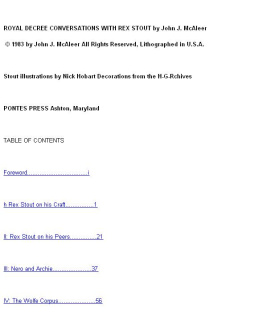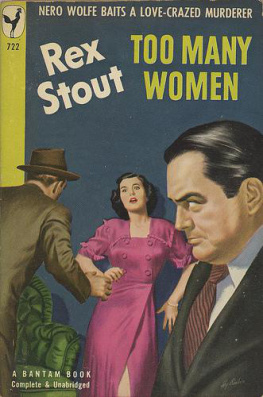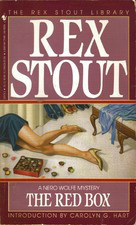John J. McAleer - Royal decree: conversations with Rex Stout
Here you can read online John J. McAleer - Royal decree: conversations with Rex Stout full text of the book (entire story) in english for free. Download pdf and epub, get meaning, cover and reviews about this ebook. year: 1983, publisher: Pontes Press, genre: Detective and thriller. Description of the work, (preface) as well as reviews are available. Best literature library LitArk.com created for fans of good reading and offers a wide selection of genres:
Romance novel
Science fiction
Adventure
Detective
Science
History
Home and family
Prose
Art
Politics
Computer
Non-fiction
Religion
Business
Children
Humor
Choose a favorite category and find really read worthwhile books. Enjoy immersion in the world of imagination, feel the emotions of the characters or learn something new for yourself, make an fascinating discovery.
- Book:Royal decree: conversations with Rex Stout
- Author:
- Publisher:Pontes Press
- Genre:
- Year:1983
- Rating:4 / 5
- Favourites:Add to favourites
- Your mark:
- 80
- 1
- 2
- 3
- 4
- 5
Royal decree: conversations with Rex Stout: summary, description and annotation
We offer to read an annotation, description, summary or preface (depends on what the author of the book "Royal decree: conversations with Rex Stout" wrote himself). If you haven't found the necessary information about the book — write in the comments, we will try to find it.
Royal decree: conversations with Rex Stout — read online for free the complete book (whole text) full work
Below is the text of the book, divided by pages. System saving the place of the last page read, allows you to conveniently read the book "Royal decree: conversations with Rex Stout" online for free, without having to search again every time where you left off. Put a bookmark, and you can go to the page where you finished reading at any time.
Font size:
Interval:
Bookmark:
Thirteen years ago Rex Stout authorized me to do a book on Nero Wolfe and Archie Goodwin. One day not long afterward, he told me that some of his friends wanted him to write his autobiography. He declined emphatically. "Any man who writes an autobiography," he said, "thinks too damn much of himself." When they saw that he meant it, one of them offered to write his biography. Rex again said no. "You know me too well," he explained.
When Rex told me what he had told them I reminded him that I didn't fall under that interdict. I had come onto the scene late in his life. At eighty-two he was almost twice my age. Could I cast my nets wider to include him, as well as Wolfe and Archie, in the book I had under way? Rex never hesitated for an instant. "In a book about Nero Wolfe and Archie Goodwin," he said, "I'd Just be a hanger-on; in one about me they'll have to stand till I sit. I like that. You've got yourself a deal."
The next seven years were busy ones. I made frequent visits to Connecticut, to High Meadow the majestic house, set in the midst of eighteen acres, which he designed, built, and landscaped, with his own hands, at a thousand foot elevation, in 1930 where I taped the miles of conversation that flowed between us. Sometimes we talked from dawn to dusk, and into the night. And when we ran out of voice (not words or ideas we never ran out of those) I prowled among his files, or read his current correspondence, or his work in progress, to all of which he gave me unrestricted access.
Rex further provided me with a letter of introduction to his kin, friends, and associates. "Include warts," he told them, and the number of letters I wrote grew and grew till the total went past the four thousand mark. Many of those I wrote to I met subsequently and interviewed in depth. And always, his wife, Pola, his two daughters, Barbara and Rebecca, and his sisters Ruth and Mary (like himself, then nearing ninety), gladly received me, counseled me, encouraged me, and shared with me precious letters, documents, photographs, and insights nurtured in their love and understanding of Rex Stout.
A few weeks before his death Rex told me that he was under a psychological compulsion not to be older than fifty-eight when he was with anybody. He was then on the eve of his eighty-ninth birthday, but he was not deceiving himself. To the end his mind was that of a man in his prime. Indeed, in the last year of his life, he wrote, in eight-weeks, A FamiIy Affair , the novel with which he closed his ten thousand page saga of Nero Wolfe, told in seventy-two tales, the first of them written forty-two years earlier when he was already forty-seven.
Rex doesn't sound fifty-eight in A FamiIy Affair . Indeed, he sounds thirty-four, for that was the age he assigned permanently to Archie Goodwin, who narrates the Nero Wolfe stories. No one reading A FamiIy Affair would suspect that it had been written by a man nearing ninety. "Rex," Clifton Fadiman had told me, "has an IQ of a hundred and eighty-five." Perhaps that was to be expected of a man who was a collateral descendant both of Daniel Defoe and Benjamin Frank! in. Even so, it seems incredible that he held together as he did, and that, at eighty-nine, as had been true all his life, he could produce a book the first draft of which was also the final draft. This is literally so. Rex Stout never put a word on paper until he knew what he wanted to say. No revision ever was necessary. His publishers set up in print, as received, the one and only draft of his books.
At the time of his death, 27 October 1975, Rex had fifty-seven books in print, more than any other living American writer. These books had sold in excess of a hundred million copies and had been translated into twenty-six languages. CBS hailed him as "the American Conan Doyle." The London Times said that of authors writing in English, Agatha Christie alone outsold him behind the Iron Curtain. In the New York Times his death was front page news. He had, the world press agreed, created one of the immortals of detective fiction. "His," said Ian Fleming, "was one of the most civilized minds ever to turn to detective fiction." The scope of his readership supported this assertion. Even Rex himself found it astonishing. He had letters from bakers, college presidents, nonagenarians, teenagers, men and women in prison, telegraphers, Hollywood movie stars, editors, actuaries, micro-biologists, nuclear physicists, GIs, waitresses, dog trainers, and the father of cybernetics, M.I.T.'s Norbert Wiener. He had still other fan letters from Justice Oliver Wendell Holmes, Franklin Roosevelt, Dwight Eisenhower, Bertrand Russell, Havelock Ellis, Aldous Huxley, Graham Greene, Georges Simenon, Cardinal Wright, Hubert Humphrey, Giscard d'Estaing, Robert Penn Warren, John Wayne, Thomas P. O'Neill, Jr., P. G. Wodehouse, Agatha Christie, J. B. Priestley, Leon Edel, William Faulkner, John Steinbeck, Oscar Hammerstein II, Henry Miller, Ross Macdonald, Ellery Queen, Robert Parker, Alfred Lunt and Lynn Fontane, Norman Cousins, Marlene Dietrich, and the Maharajah of Indore.
Order was essential to Rex's peace of mind. By temperament he was a scheduler. Every Sunday, without fail, I sent him a questionnaire, supplementing the questions I put to him during our frequent summit meetings at High Meadow. He caught my rhythms and incorporated me into his schedule. Over one hundred and eighty-seven weeks he dutifully answered and returned to me one hundred and eighty-seven questionnaires, answering, in all, more than seventy-five hundred questions. I did learn to give him a week off while the World Series was on, and to announce my visits three days in advance. "I'm still breathing," he would say, "Come ahead."
Letters came from him, too, at a steady rate in all, more than four hundred of them.
At the outset I sometimes misjudged Rex's mind set. I conjectured, for example, that money meant nothing to him. After all, he had given away hundreds of thousands of dollars to the causes he held dear the war against Hitler, the Writers War Board (which he headed up for four years, while taking no salary), Freedom House, the Writers Board for World Government, the United World Federalists, the Society for the Prevention of World War III, Amnesty International, the Authors League, the Authors Guild. "You couldn't be more wrong," he said. "Money provides all of my freedom and many of my pleasures." Another time I surmised that his pithy letters were the product of concentrated effort. "I give them a few seconds," he said. Eventually lvcould predict the substance of his answers before he made them. For example, Rex on seat belts: "Wearing a seat belt is like wearing a helmet through town on the chance that someone might drop something on your head." On motorcycles: "I sneer at them."
I think Rex kept a fever chart on me for several months after L officially got to work on the authorized biography. He chided me once for spelling "okay" with an "e." He was shocked when lv owned up that I didn't know how many nipples were on a cow's udder. How could a man with a Ph.D. from Harvard not know a basic fact like that? If I phrased a question badly he answered it but put the offending phrase in quotation marks to remind me that it was not his .
Rex hated pretense. If you didn't understand something, for example the working of the school banking system that he invented and realized a half a million dollars on before he was forty, or the complex reorganization of the Authors League, which he undertook and carried out when he was seventy-seven, it was best to say so. He would explain it patiently and stay with it until you had it clear in your mind. "He never makes you feel I ike a dumbbell," his daughter Rebecca told me.
That was quite true.
Though not easy to impress, Rex respected thoroughness. He guffawed when I came up with the real identity of Lieutenant Roweliff a well-guarded secret. And when I located, in an auto motor court, in Springfield, Massachusetts, the venerable Julia Sanderson (his girlfriend in the Teddy Roosevelt era), thunderstruck for once, he said, "You have found Julia Sanderson!" After that he used to say to me, "You're one hell of a research man."
Font size:
Interval:
Bookmark:
Similar books «Royal decree: conversations with Rex Stout»
Look at similar books to Royal decree: conversations with Rex Stout. We have selected literature similar in name and meaning in the hope of providing readers with more options to find new, interesting, not yet read works.
Discussion, reviews of the book Royal decree: conversations with Rex Stout and just readers' own opinions. Leave your comments, write what you think about the work, its meaning or the main characters. Specify what exactly you liked and what you didn't like, and why you think so.











